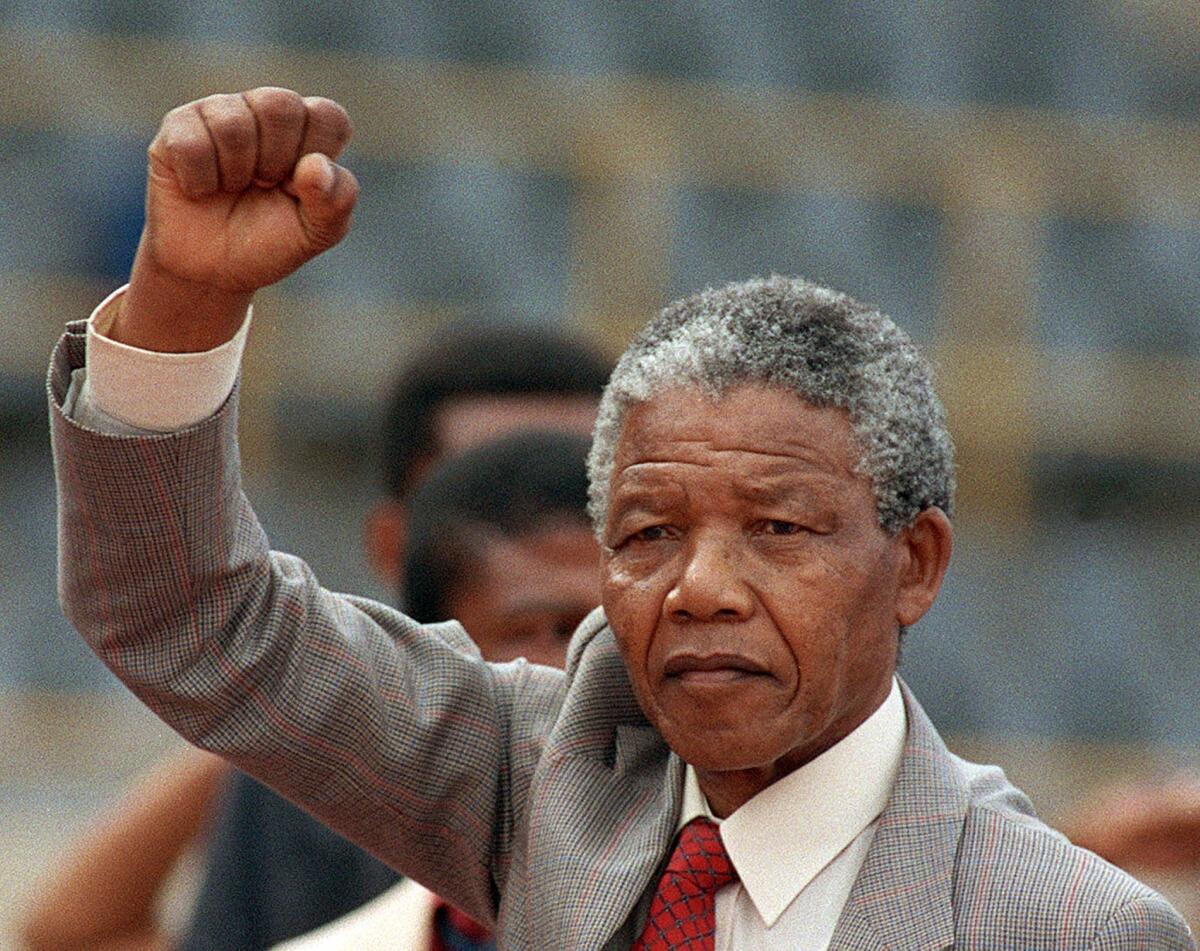The Mandela who saved South Africa -- and offered me orange juice

- Share via
It was always there, shimmering on the horizon out my bedroom window: Robben Island, a barren outcrop in the dazzling Atlantic Ocean and the world’s most notorious prison. And from as far back as I can remember, there was one fact we knew about that patch of land: Nelson Mandela was there.
To white South Africans like me, raised within the coddled stranglehold of apartheid, Mandela was not only an icon, as he’s been described on TV networks across the world in the hours since his death Thursday. He was a towering presence, even in his absence. “Madiba” was a name whispered furtively, and later chanted in fury as students rampaged through the streets, as the one person who might change our country.
He did, although it would take years. By the time he walked out of prison in 1990, the country had been ravaged by massacres and mass detentions, its economy in tatters from international sanctions. After decades of forced separation, discrimination, relocations, torture and imprisonment, there seemed no way to heal the wounds that had ripped through South Africa. No way, that is, except one: To free Mandela.
PHOTOS: Nelson Mandela through the years
I was outside the prison gates the day Mandela walked out on Feb. 11, 1990. As a young correspondent, I clutched a notebook and pen. But in truth, there was nothing to write that could do the moment justice. Hundreds of thousands of people poured into the streets, clambering over bridges, banging on the windows of the small car he was driven away in as it snaked through the crowds to get to Cape Town’s City Hall, where he delivered his first words of freedom in 27 years from the mayor’s balcony.
The scene was so chaotic that for a while the mass of humanity gathered in the Grand Parade grounds underneath wondered if the old man might topple over in the turmoil. For decades, people had longed to hear just one word from Mandela. In the end, most of what he said that extraordinary night was rambling, or drowned out by the chants. After the speech ended, my mother, a political activist and strong Mandela supporter, joked to me, “The whites always thought Mandela would kill them, but he might just bore them to death.”
In fact, the truly history-making words had come nine days before, when South Africa’s last white president, President F.W. de Klerk, stood up in the Parliament building, just down the street from where Mandela stood that first night out of jail, and uttered one sentence that changed South Africa’s entire course: “The season of violence is over.” The country went wild, with people unfurling the African National Congress flag, which had been banned for decades, and screaming in disbelief through the streets. Nothing would ever be the same again.
PHOTOS: Notable deaths of 2013
Days after Mandela’s release, I sat in his pocket-sized frontyard in Soweto. From across the country people had converged, wanting a glimpse of this man. On a plastic garden chair, an old man in a brown felt hat took from his inside pocket a crumpled piece of paper, outlining a tribal dispute he needed Mandela’s help with. When the crowd finally thinned, Mandela sat for an interview. A servant brought a glass of orange juice and sat it in front of me, and I continued writing, ignoring the drink. Finally, Mandela leaned over and said softly, “Drink your orange juice, my dear. It won’t spoil your pretty little figure.” The remark stopped me in my tracks, since no political figure who had lived through the 1980s would have made such a remark.
There would be more extraordinary times, including the night I found myself accidentally on a midnight flight from Johannesburg to Cape Town, alone on the plane with Mandela and his bodyguard, a young returned guerrilla whom I’d once met during his days in exile in Zambia. I persuaded the bodyguard to switch seats with me, and for two hours, I awkwardly tried to press an exhausted Mandela into talking. It was not the best interview, despite the momentous occasion.
Two decades on, white South Africans say they are still amazed at how the new country has unfolded. And even today, I catch myself a little breathless driving past a public school whose playing fields are filled with teenagers of all colors, seemingly unaware of how impossible such a sight might once have been.
TIMELINE: The remarkable life of Nelson Mandela
There is plenty to complain about, for sure: Corruption, poverty and dysfunction are everywhere. But so too is a sense that it could all have ended in spectacular mass violence, as the grim scores of apartheid were settled.
But for Mandela, that might well have been.
ALSO:
Fulfilling the legacy of Nelson Mandela
Readers on Nelson Mandela: He made the world a better place
Vivienne Walt is a Paris-based contributor to Time magazine. Follow her on Twitter: @vivwalt
More to Read
A cure for the common opinion
Get thought-provoking perspectives with our weekly newsletter.
You may occasionally receive promotional content from the Los Angeles Times.






